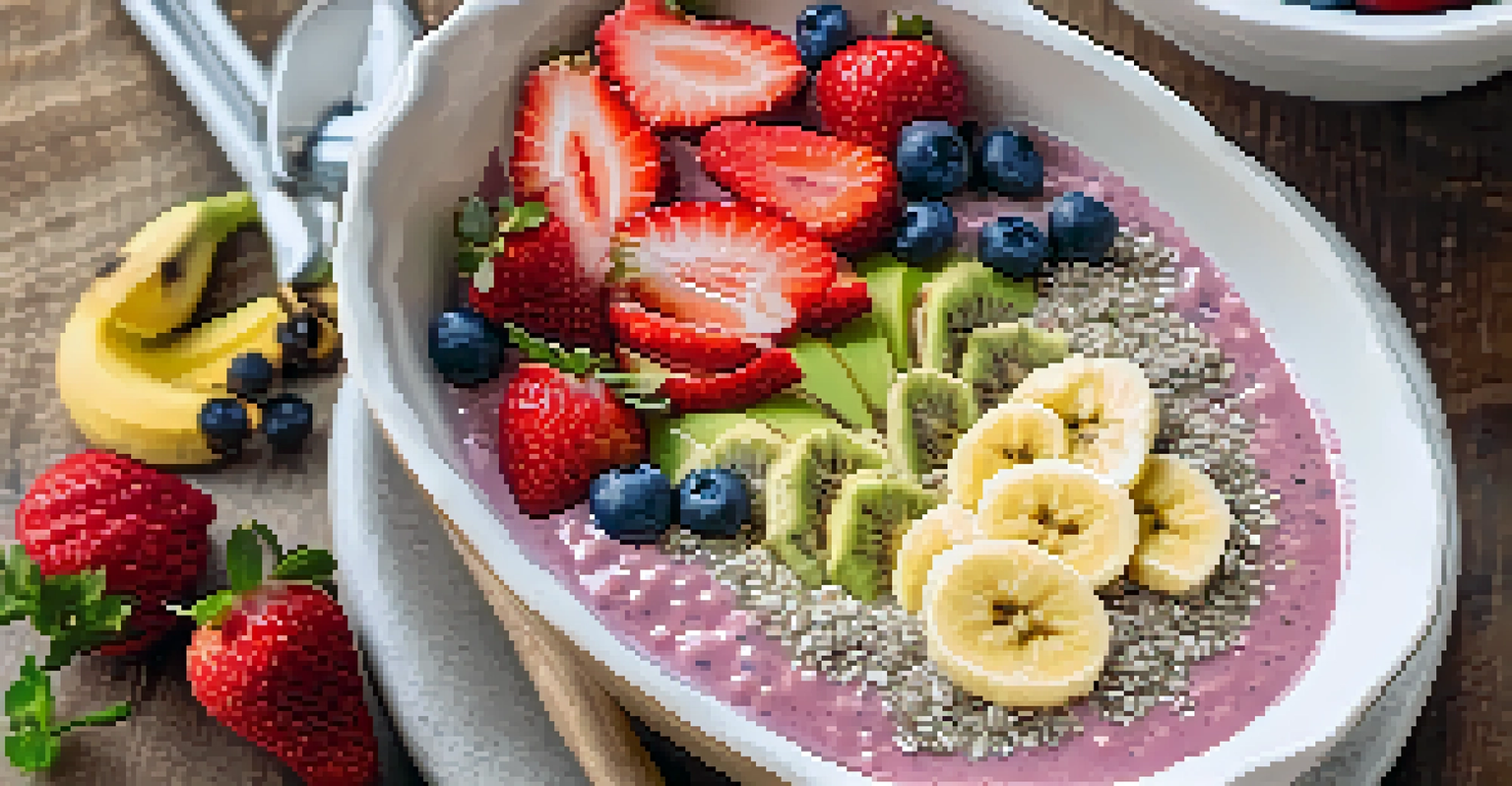Raw Foods: A Natural Approach to Anxiety Management

Understanding Anxiety and Its Impact on Daily Life
Anxiety can feel like a constant weight on your chest, making even simple tasks seem daunting. Many people experience anxiety in various forms, from general unease to intense panic attacks. It’s not just a mental struggle; it can affect your physical health, sleep patterns, and overall quality of life.
Let food be thy medicine and medicine be thy food.
In today’s fast-paced world, anxiety has become increasingly common, and many are seeking natural solutions to manage it. This is where the concept of raw foods comes into play, offering not just nourishment but also potential relief from the grips of anxiety. By focusing on what we eat, we can impact how we feel both mentally and physically.
Understanding the connection between diet and mental health is crucial. Just as certain foods can make you feel energized and happy, others can contribute to feelings of anxiety. By exploring raw foods, we open the door to a natural approach that may help us regain control over our anxiety.
What Are Raw Foods and Their Benefits?
Raw foods are exactly what they sound like: foods that haven’t been cooked, processed, or refined. They typically include fresh fruits, vegetables, nuts, seeds, and sprouts, all bursting with nutrients. The idea behind consuming raw foods is that they retain their natural enzymes and nutrients, which can be lost during cooking.

One of the key benefits of raw foods is their high content of vitamins and minerals, which play a vital role in brain health. For example, leafy greens are packed with folate, which has been linked to reduced anxiety levels. Incorporating more raw foods into your diet can provide your body with the nutrients it needs to function optimally, both physically and mentally.
Anxiety Affects Daily Life
Anxiety can manifest physically and mentally, impacting overall quality of life.
Moreover, raw foods are often rich in antioxidants, which can help combat oxidative stress. This natural stressor can contribute to feelings of anxiety and depression. By choosing raw foods, you might be giving your body a powerful tool to fight back against these mental health challenges.
How Raw Foods May Help Alleviate Anxiety
The relationship between diet and mental health is a growing area of research. Studies suggest that certain nutrients found in raw foods can help regulate mood and reduce anxiety symptoms. For example, omega-3 fatty acids, present in flaxseeds and walnuts, are known to support brain health.
Your diet is a bank account. Good food choices are good investments.
Additionally, raw foods are often high in fiber, which can stabilize blood sugar levels. When your blood sugar fluctuates, it can lead to feelings of irritability and anxiety. By eating a diet rich in raw fruits and vegetables, you may help keep your blood sugar steady, leading to a more balanced mood.
Furthermore, the hydration from raw foods, particularly fruits and vegetables, can improve overall well-being. Staying hydrated is essential for maintaining energy levels and cognitive function, both of which can impact anxiety. So, embracing raw foods might just be a refreshing way to manage stress.
Essential Raw Foods for Anxiety Management
When it comes to raw foods that can help with anxiety, some stand out more than others. Leafy greens like spinach and kale are incredibly nutrient-dense, providing essential vitamins that can boost your mood. Berries, rich in antioxidants, also play a significant role in supporting mental health.
Nuts and seeds are another great addition; they are packed with healthy fats and proteins that can help stabilize your mood. For instance, almonds and sunflower seeds provide magnesium, which has been shown to alleviate anxiety symptoms. Incorporating these foods into your daily diet can be delicious and beneficial.
Raw Foods Aid Mental Health
Incorporating raw foods into your diet can provide essential nutrients that help alleviate anxiety.
Don't forget about the power of hydration! Fresh fruits like watermelon and cucumbers not only keep you hydrated but also offer a refreshing, low-calorie snack. Experimenting with different raw food combinations can lead to tasty meals that nourish both your body and mind.
Simple Ways to Incorporate Raw Foods into Your Diet
Incorporating raw foods into your diet doesn't have to be complicated. Start by swapping out cooked snacks for fresh fruits and vegetables. For example, instead of reaching for a bag of chips, try crunchy carrot sticks or slices of cucumber paired with hummus for a satisfying crunch.
You can also make simple salads with a variety of raw ingredients. Toss together greens, nuts, seeds, and your favorite dressing for a quick meal. Smoothies are another fantastic way to blend raw fruits and vegetables, providing a nutrient-packed drink that’s both delicious and easy to consume.
Consider meal prepping raw foods for the week. Chop up fruits and vegetables in advance so they’re ready to grab when hunger strikes. This can help remove the temptation to reach for less healthy options, making it easier to stick to a raw food regimen.
Listening to Your Body: The Importance of Mindfulness
As you explore the benefits of raw foods, it’s essential to practice mindfulness when eating. Paying attention to how different foods make you feel can help you identify what works best for your body and mind. This awareness can empower you to make healthier choices that promote well-being.
Mindful eating is about savoring each bite and truly enjoying your food. When you take the time to appreciate what you’re eating, you may find that you feel more satisfied and less likely to overeat. This practice can also help reduce stress, as it encourages you to slow down and be present in the moment.
Mindfulness Enhances Eating Experience
Practicing mindfulness while eating can improve your relationship with food and support mental well-being.
Combining mindfulness with a raw food diet can create a holistic approach to anxiety management. By tuning into your body’s signals and making intentional choices, you can foster a healthier relationship with food and support your mental health in the process.
Consulting with Professionals for Personalized Guidance
While adopting a raw food diet can be beneficial, it’s important to consult with a healthcare professional, especially if you have underlying health conditions. A registered dietitian can provide personalized advice tailored to your specific needs, ensuring you get all the nutrients necessary for optimal health.
Additionally, if anxiety is significantly impacting your life, a mental health professional can offer support and strategies to manage it effectively. Combining dietary changes with therapy or counseling can lead to a more comprehensive approach to anxiety management.

Remember, transitioning to a raw food diet doesn’t have to happen overnight. It’s a journey that should be taken at your own pace. With the right support and resources, you can discover how raw foods can play a role in your overall mental health and well-being.